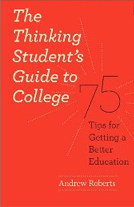
I’ve always felt that parents and teenagers spend too much time worrying about getting into college. I wish teenagers, in particular, diverted some of their energy into making sure that their college years will be successful.
For everybody who agrees with me that the latter goal is vastly more important, I want to recommend a book, The Thinking Student’s Guide to College: 75 Tips for Getting a Better Education, that would be a perfect gift for a new college student.
If you are only going to buy one college-related book this year, I strongly urge you to purchase this one.
Andrew Roberts, an associate professor of political science at Northwestern University, wrote The Thinking Student’s Guide to College. This book is certainly needed during a time when an alarming number of students manage to graduate from college without growing academically. That was the conclusion of a blockbuster book released a few years ago entitled, Academically Adrift, which concluded that 45% of freshmen and sophomore learn little in college. You can see what I wrote about those finding here: Do Undergrads Learn Much in College?
If teenagers follow Roberts’ advice about squeezing the most value out of their undergraduate years, they won’t be among the many who bungle their way through college.
Andrew Roberts, an assistant professor of political science at Northwestern University, wrote this great book that can help students squeeze far 
What’s Inside the Book
Here are the broad categories that Roberts covers in his book:
- Choosing a school (If you don’t know the differences between a college and a university, you really should read this book!)
- Selecting a major.
- Choosing college classes.
- Being successful in college.
- Interacting with professors.
- Learning outside the

- Attending graduate school.
- Rules professors live by.
Because so many college students don’t know how to take advantage of their academic choices, I’m sharing a few of the 25 tips for selecting classes that Roberts provides in his easy-to-digest book:
1. Visit 5 to 10 classes during the first week of a semester.
Try a different class during every time slot. Sampling classes can provide an early impression about which ones are worthwhile and which would be busts. If a promising class is filled, try again the next semester.
2. Aim for variety.
High school students are not familiar with most subjects that colleges offer. That’s a great reason why underclassmen, in particular, should sample as many different disciplines as possible. By dabbling, they are more likely to discover a discipline that they like.
3. Don’t rush to complete general-ed requirements,
Freshmen and sophomores tend to focus on fulfilling their general-ed requirements early, but Roberts says that’s a bad idea. If you postpone some of the general-ed requirements, you can better determine which subjects that you’d really like to focus on in college.
4. At least once a year, take a class that challenges your beliefs.
Leave your comfort zone and become acquainted with world views that don’t sync with yours.
If you’re a conservative, consider taking a class on Marxism or perhaps women’s studies. If you’re an atheist, try a theology course. A liberal could choose a class on conservative political thought.
Even if you ultimately hate the course, Roberts suggests that you should learn more than if you had simply chosen a class that confirms your beliefs.
5. Take writing-intensive classes.
Choosing classes that requires copious writing sounds grueling, but Roberts offers pragmatic reasons for volunteering for this torture. Employers want graduates who can write, and you’re not going to get a pass even if you’re majoring in a technical or scientific field.
You will also receive more attention from a professor in a writing-intensive class since he/she must review what you write.
6. Read faculty evaluations.
Most universities have students complete faculty evaluations at the end of each semester. If the results are made public—and they often are—pour through them.
Students tend to agree with each other on what classes are best, and these also seem to be correlated to performance. Students perform better in classes that they rate highly.
7. Consider auditing classes.
The typical college student takes around 30 classes during their college career. In contrast, a university may offer 1,000 or more. If you want to soak up as much learning as possible, audit some classes.
Read More…
A New Tool to Measure College Costs

Hi, I’m interning with AdmitSee.com, which pays you to share your old college application essays & advice. Thought you might be interested–you get paid every time an applicant views your profile. Totally anonymous and only takes minutes 🙂